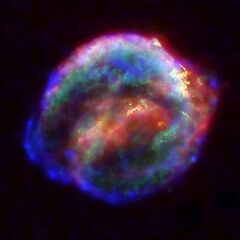UnNews:President Obama 'hopeful' to avoid double-dip supernova
| The news outlet with approval higher than Congress | ✪ | UnNews | ✪ | Monday, February 2, 2026, 00:38:59 (UTC) |
| President Obama 'hopeful' to avoid double-dip supernova | 
|
6 October 2011

Washington, United States -- Prompted by the downgrading of the sun's surface from 'intact' to 'exploding', President Obama has reiterated his belief that the core of the star would not contract upon itself for a second successive quarter and finally spill its contents across the galaxy.
Even the most optimistic observatories now believe this second round of the crisis has been inevitable since both Mercury and Venus were taken over by the raging solar mass in an attempt to create hydrostatic stability.
The President of the United States, speaking from the press room lectern to an audience of political correspondents, remained "positive" that an abundant store of remaining helium fuel would see the star return to its previous highs as provider of all life. However, the resolute Obama admitted to the reporters that helium production has slowed dramatically since the 2008 structural failure of the hydrogen fusion system that wiped out all productive human endeavour. The President sought to reassure citizens that he was doing all in his power to prevent the many millions of nuclei cast from productive work from becoming a solid nickel-iron core.
To conclude his statement, the President praised the proposed Eurozone rescue package, consisting of 12 tonnes of mostly German hydrogen, as substantial reassurance for the 2 octillion tonne stellar body. A two hour discussion with German chancellor Angela Merkel the night prior had given Obama 'renewed optimism' that the agreement would allow the star to meet the gravitational obligations that maintain a single solar system. The leader of the United States quickly departed the room, refusing to answer questions concerning the exact atomic weight of the core elements, believed to be the greatest number since record keeping began in 1959.
The announcement follows repeated criticism of the current administration by House Republicans for allowing the level of core elements heavier than helium to grow 38% during Obama's tenure as commander-in-chief. In response, the President cited the stubborn refusal in July of the House to pass a bill increasing the Chandrasekhar limit but that he also respected the rare willingness of the Republican party to recognise the laws of nature.
Bloomberg writers delivered a cutting analysis within hours of the message. Skeptical of further measures to revive the troubled star, both analysts concluded thus to online readers;
- Let us not forget that but a few short years ago this stellar entity was expelling 10 million tons of hydrogen a second to any and all takers. How the globe became dependent on this single, irresponsible source of sunlight is a poignant question for all contemporary astronomers.
Their voices join a chorus of respected astronomers who have suggested that the catastrophic failure of the star's being is a result of it existing beyond its means.
"All eight planets bathed in the supposedly free warmth of this sun," pointed out London physicist John Herschel in an interview following the message.
- "Plants eagerly drew their energy from this star and, in turn, supported the extravagant animal life of caviar and fur coats we see today. That's a textbook speculative bubble if ever I've seen one."
The physicist questioned how this market had been allowed to sustain humanity and why someone, possibly subterranean Mole-people, had not injected some sanity into the discussion. "The heavenly body is, for all intents and purposes, now to big to fail," surmised Herschel.
The President's statement comes two days after a report by Standard & Poors showing that the world economy would actually be in a better position if humanity ceased to exist.
Sources[edit]
- Milton Completely-Friedman "Quarterly forecast shifted from "peaceful death" to "slow, painful" on news of Obama speech.". San Francisco Chronicle, {{{date}}}